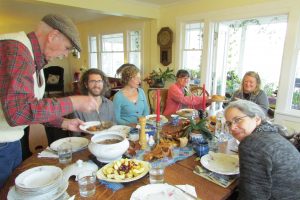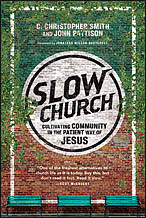As you know I am getting ready for the upcoming blog focus on Hospitality and the Kingdom of God. Have been doing lots of reading, thinking and praying about it.
When I decided on this topic I had no idea how impacting it would be on my own life. It is helping me to rethink the focus of my faith and how I practice it.
Communion not conversion. Eating together, sharing life and fellowship together this is the place where we are inspired by Christ and fed by him to go out and do his work in the world.
So many today find church boring and irrelevant, but eating is relevant for all of us. And when done properly with us all sitting down together, relaxed, laughing, sharing stories, it is the richest experience of Christ and Christ’s family we can ever have.
This morning I found my thoughts focusing once again on the two occasions we read about Jesus eating with his disciples after his resurrection. Christ comes in the stranger on the Emmaus road. His true nature is recognized only when he breaks bread together with his fellow travellers. (Luke 24:30, 31) We also find him by the sea of Galilee, preparing breakfast for his closest friends. Here he is recognized when the nets almost break with the abundance of God’s provision. And then they break bread together, sharing their lives with the living Christ. (John 21:13). Even when Jesus appears to the disciples together it is at the dinner table, and he proves who he is by eating with them (Luke 24:42).
How much, I wonder, does our fast food, TV dinner lifestyle disconnect us from Christ and God’s family? Eating alone, isolated from our human families, unaware of where our food comes from and of those who have produced it, strips us of both our humanity and our divinity. To be made in the image of God means to eat together with friends and strangers alike. It means to make the excluded feel included, as Jesus did by sitting down with the tax collector. It means to see abundance when others see scarcity, as is demonstrated by the feeding of the 5,000. And it means to be caught up in a foretaste of the kingdom banquet feast, as the first disciples were when they ate the last supper together.
We need to rediscover the joy of eating together – not just of sitting down at table, but the joy of growing and preparing food together. Perhaps its time we all joined the Slow Food movement, a global, grassroots organization linking the pleasure of good food with a commitment to their community and the environment.
Chris Smith and John Pattison authors of Slow Church will be with us Monday night. In this wonderful and timely book they remind us that:
Slow Food and the other Slow movements hold important lessons for the American church. They compel us to ask ourselves tough questions about the ground our faith communities have ceded to the cult of speed. And they invite all of us—clergy, theologians and laypeople—to start exploring and experimenting with the possibilities of Slow Church. Not as another growth strategy, but as a way of re-imagining what it means to be communities of believers gathered and rooted in particular places at a particular time.
I think that they are right. We need to learn that at the centre of our faith is the communion table, a place of rich fellowship and shared life, an experience that cannot be hurried if we truly value our faith and the faith communities of which we are a part.
What do you think?



2 comments
Recently asked to think about a spirituality of migration – but it seems a theology of hospitality needs to be there to receive it…
Amen John – migration without welcoming hospitality is very barren as many refugees have discovered.